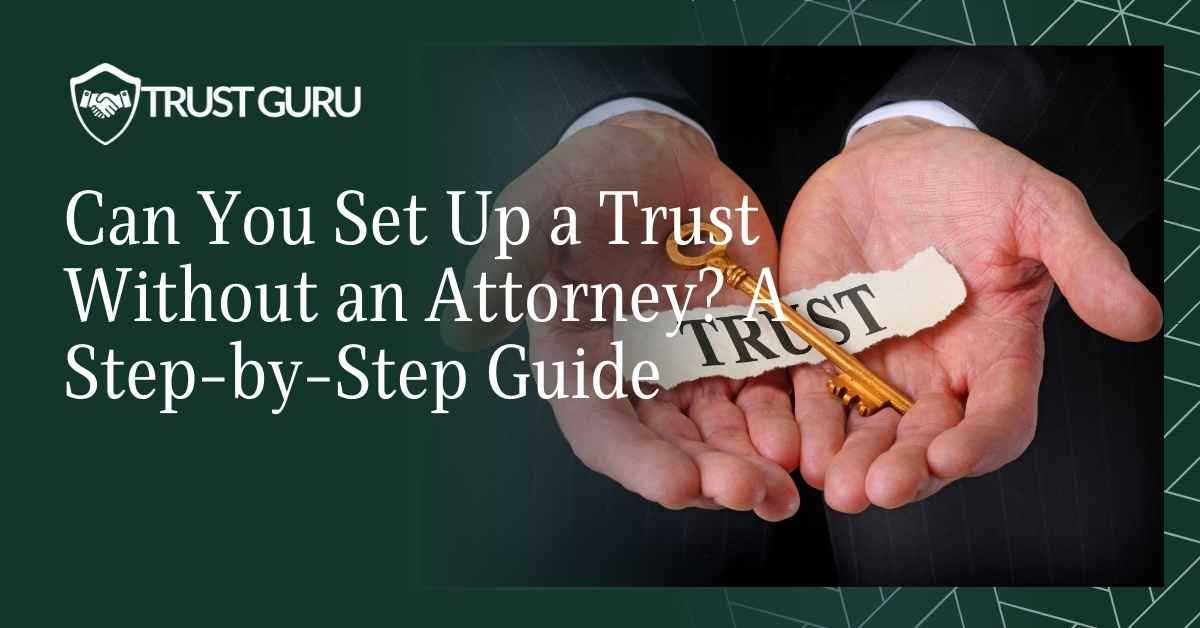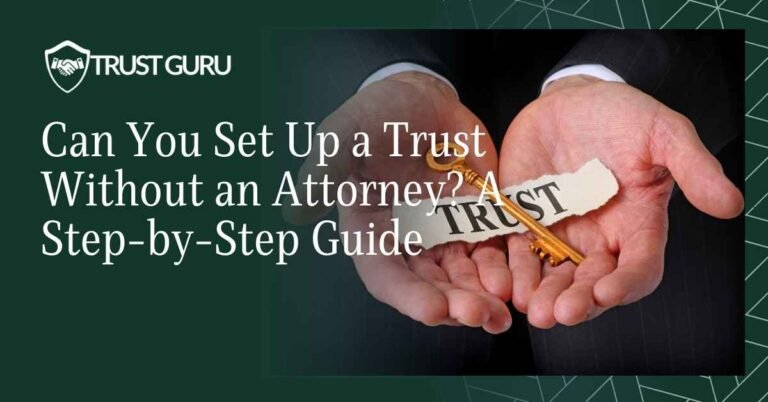Can you set up a trust without an attorney? It’s a question many people ask when looking to protect their assets, avoid probate, and simplify estate planning—without paying steep legal fees. In this guide, we’ll break down when a DIY trust might work, when legal help is essential, and how to create a legally sound trust step by step.
Whether you’re planning your legacy or just exploring your options, this article will help you make a confident, informed decision.
What you’ll learn:
- Understanding the Purpose of a Trust
- Can You Legally Set Up a Trust Without an Attorney?
- Steps to Create a Trust Without a Lawyer
- Risks of Setting Up a Trust Without Professional Help
- DIY vs Attorney vs Trust Guru: What’s Right for You?
- What-You-Need-to-Set-Up-a-Trust
- Frequently Asked Questions

Understanding the Purpose of a Trust
A trust is a legal arrangement that allows you to transfer ownership of your assets to a third party—known as a trustee—who manages them on behalf of your chosen beneficiaries. It’s a foundational tool in estate planning, designed to ensure your wealth is distributed according to your wishes while avoiding unnecessary legal complications like probate.
People set up trusts for a variety of reasons: to simplify the transfer of assets after death, to maintain privacy, to protect loved ones from court delays, and to control how and when heirs receive their inheritance.
For example, placing your home or investment accounts into a revocable living trust allows you to retain control during your lifetime while making it easier for your beneficiaries to receive those assets after you’re gone.
On the other hand, an irrevocable trust may offer greater tax advantages and asset protection but limits your ability to make changes later. Explore the differences between revocable and irrevocable trusts in estate planning.
At the heart of every trust is a trust document—a legally binding agreement that outlines your intentions, names your beneficiaries, and defines how your assets should be managed. When crafted properly, this document becomes a cornerstone of your estate plan, ensuring your legacy is preserved and your family is protected.
What Makes a Trust Legally Valid?
To be recognized as a valid trust, certain elements must be in place. These include:
- Grantor: The person creating the trust.
- Trustee: The individual or institution responsible for managing the trust assets.
- Beneficiary: The person(s) or organization(s) who will receive the assets.
- Trust Assets: The property, accounts, or valuables placed into the trust.
- Trust Agreement: The written legal document that sets the terms of the trust.
Each state may have its own legal compliance and risk oversight rules governing how a trust must be structured, signed, and funded to be considered legally binding. For example, some states require notarization or specific witness signatures for the name of the trust to hold legal weight.
Failing to meet these requirements for a valid trust can lead to disputes or even invalidate the trust altogether. Check our latest blog: step-by-step guide on how to set up a living trust
Key takeaway: A trust can be a powerful tool in your estate planning strategy, but only if it’s created and executed correctly. Understanding its purpose and the legal standards that define its validity is essential for protecting your assets and ensuring your wishes are carried out.

Can You Legally Set Up a Trust Without an Attorney?
Yes, in many cases, you can legally set up a trust without hiring an attorney. For individuals with straightforward financial situations and clear intentions for asset distribution, a do-it-yourself (DIY) approach may be both legally sound and financially practical. Thanks to digital tools and guided platforms, it’s more accessible than ever to create a trust without an attorney—as long as you understand what’s required and where the risks lie.
Still, the feasibility of making a trust without professional assistance depends heavily on your personal and financial complexity. Below, we’ll explore two scenarios to help you determine where your needs fall.
When a DIY Trust Might Work
A DIY trust can be a smart option for those with simple estates and uncomplicated family structures. For example, if you’re a single homeowner with no dependents, and you want to transfer your home and a few financial accounts to a sibling or a close friend, setting up a revocable living trust without an attorney could be a straightforward process.
This approach offers a few key benefits:
- Cost savings: You avoid high attorney fees, which can range from hundreds to thousands of dollars.
- Speed and control: You can create the trust on your timeline and revise it as needed during your lifetime.
- Accessibility: Many platforms, like Trust Guru, offer step-by-step guidance and attorney-reviewed templates that simplify the process for people seeking to create a trust without legal assistance. Review expert guidance on when a DIY trust is appropriate
That said, even with a revocable living trust, you must follow your state’s legal requirements and ensure your trust is properly funded to make it effective. Skipping any key steps—even unintentionally—can result in complications later.
When You Probably Need an Attorney
While a DIY trust can work in straightforward cases, it’s not always the right solution. If your estate involves more complexity—such as blended families, minor children, high-value assets, or special needs beneficiaries—it’s often wise to consult an experienced attorney or an estate planning attorney.
Here are some common situations that typically require professional legal support:
- You have a blended family or multiple marriages: Clear, legally enforceable terms are crucial to avoid inheritance disputes.
- You’re creating a special needs trust: These require precise language to protect the beneficiary’s eligibility for government benefits.
- You need business succession planning: These types of assets often have unique legal and tax considerations.
- Your estate may face significant estate taxes: Strategic planning with a professional can help minimize your tax burden. Understand estate tax thresholds and exemptions with this IRS guide
In these cases, proceeding without expert guidance could lead to an ineffective trust—one that doesn’t hold up legally or fails to meet your goals. An attorney can help you craft a plan that complies with state laws, anticipates potential conflicts, and ensures your assets are protected as intended.
Key takeaway: While it’s entirely possible to set up a trust without a lawyer, it’s not always advisable. The more complex your estate, the more value a qualified professional can bring in terms of security, accuracy, and peace of mind.

Steps to Create a Trust Without a Lawyer
If you’re considering how to set up a trust without an attorney, it’s essential to follow the right steps to ensure your trust is legally valid and effective. While the process can be simplified through digital tools and online platforms, skipping key requirements could jeopardize your goals. Below is a practical, step-by-step breakdown to help you through the process of creating a trust yourself.
Choose Your Trust Type
The first and most important decision is selecting the type of trust that suits your needs. Most individuals setting up a trust without a lawyer choose a revocable trust, which allows you to retain control of the assets during your lifetime and make changes as your circumstances evolve.
Alternatively, an irrevocable trust cannot be modified once it’s executed. While it offers potential benefits like asset protection and estate tax reduction, it requires careful planning and is generally not recommended for a DIY approach unless you have advanced legal knowledge or professional guidance. Review the IRS explanation on how gifts and inheritances are treated for tax purposes
When choosing between a revocable and irrevocable trust, consider the complexity of your estate, your long-term goals, and whether you need flexibility over time. If you’re unsure, starting with a living trust without an attorney is more manageable for most individuals with straightforward needs.
Draft the Trust Document
Once you’ve chosen the right structure, the next step is to create the trust document—the legal foundation of your trust. This document should clearly identify the grantor (you), the trustee (the person managing the trust), and the beneficiaries (those who will receive the assets). It must also define the terms of asset distribution and outline how the trust will be managed over time.
To do this effectively, you’ll need:
- A clear trust agreement using language that complies with your state’s trust laws
- Specific instructions for asset management and distribution
- Defined roles and responsibilities for trustees
Many people use online platforms like Trust Guru, which offer digital templates and guided forms to simplify the process of creating a living trust. These tools ensure the legal document is thorough, clear, and aligned with legal standards in your state, making it easier to complete without attorney oversight.
Fund the Trust
Creating a trust isn’t complete until you fund the trust—in other words, you must formally transfer ownership of your assets into it. This step is critical because an unfunded trust has no legal power to control your property.
Common assets you may place in a trust include:
- Your home or other real estate
- Bank accounts
- Investment portfolios
- Business interests
- Life insurance policies
For example, If you’re transferring real estate, you may want to explore real estate protection strategies to ensure liability safeguards. The title transfer must follow your state’s laws to be legally binding. Failing to do this correctly is one of the most common mistakes in DIY trust creation.
Be sure to update account titles and beneficiary designations where necessary to reflect the trust’s ownership, or the assets may be excluded from your trust after your death.
Sign and Notarize
The final step in setting up your trust is signing the document according to your state’s legal requirements. In most states, the trust agreement must be signed in the presence of a notary public and, in some cases, additional witnesses.
To ensure your trust is valid, make sure to:
- Use your full legal name when signing
- Sign in front of a licensed notary
- Have witnesses present if your state requires it
- Keep a copy of the signed trust in a safe, accessible location
Some states also require the trustee to sign or acknowledge the document. It’s a small but important detail that, if overlooked, could cast doubt on your trust’s validity.
Key takeaway: While it’s possible to set up a trust without a lawyer, attention to detail is critical. Choosing the right trust type, drafting a legally sound document, properly funding it, and following signing requirements will help ensure your trust performs exactly as intended.

Risks of Setting Up a Trust Without Professional Help
While creating a trust on your own can save time and money, there are real risks involved if the process isn’t handled carefully. A trust that’s poorly worded, incomplete, or improperly executed may not function as intended—and in some cases, it could be legally invalid. These missteps can lead to confusion, disputes among beneficiaries, or even court involvement after your death.
Here are some of the most common pitfalls when setting up a trust without professional guidance:
- Vague or incorrect language in the trust document can create ambiguity or loopholes.
- Unfunded trusts—where assets are not properly transferred into the trust—are legally ineffective.
- Missed formalities, such as not notarizing or failing to comply with state-specific rules, can invalidate the trust altogether.
- Naming errors—such as incorrect beneficiary designations or inconsistencies between documents—can cause unnecessary delays or legal challenges.
These risks grow significantly when dealing with tax-sensitive scenarios like income distribution management or trust tax compliance. Mishandling these areas could lead to audits or financial penalties. Without proper structure and legal clarity, even well-intentioned DIY trusts can become ineffective trusts that fail to meet your goals.
Tax & Legal Implications
One of the most overlooked dangers of a DIY trust is its potential impact on taxes and legal compliance. A trust that isn’t structured correctly may create unintended tax implications, such as exposing your estate to unnecessary estate tax burdens or disqualifying beneficiaries from receiving certain public benefits. Read how to structure a special needs trust to avoid disqualifying government benefits
For instance, transferring property into a trust without understanding how it affects capital gains or property tax reassessment could lead to costly consequences. Similarly, if the trust fails to meet IRS standards for irrevocable trusts or income distribution, it might be subject to additional scrutiny or audit.
These are areas where an attorney can explain the nuances and help you avoid common traps. Legal professionals understand the interaction between state trust laws, federal tax rules, and individual estate goals. They can provide legal advice tailored to your unique situation—especially if you have a high-value estate, own out-of-state property, or need asset protection strategies.
Key takeaway: While it’s possible to create a trust without a lawyer, the risks grow significantly when tax and legal complexities are involved. For peace of mind and long-term effectiveness, it’s worth considering when professional support might protect your assets—and your loved ones.

DIY vs Attorney vs Trust Guru: What’s Right for You?
When it comes to trust creation, you have several options—and each one offers a different level of cost, convenience, and legal protection. Choosing the right path depends on your specific financial situation, family dynamics, and comfort level with legal documentation.
Here’s a breakdown of the pros and cons of each approach:
| Approach | Pros | Cons |
| DIY (Do-It-Yourself) | – Low upfront cost- Flexible, convenient- Great for simple estates | – Easy to make legal mistakes- No legal review- May invalidate the trust if done incorrectly |
| Attorney | – Personalized legal advice- Ideal for complex estates- Handles all formalities | – High cost ($1,000–$3,000+)- Time-intensive- Less tech-friendly |
| Trust Guru | – Attorney-reviewed digital solution- Lower cost than traditional firms- Fast, guided process- Nationwide validity | – May not be ideal for extremely complex estates- Still requires user input and decision-making |
Why Trust Guru is a Smart Middle Ground
Trust Guru bridges the gap between DIY tools and expensive law firms. With attorney-reviewed documents and trustee support services, it offers both peace of mind and user-friendly guidance.
Here’s what makes Trust Guru stand out:
- Attorney-reviewed documents ensure every trust meets legal standards.
- Built-in support and educational guidance from experts in estate planning.
- Accepted in all 50 states and tailored to comply with state-specific laws.
- Transparent pricing with no hidden legal fees.
- Fast, digital workflow that allows you to build your trust from the comfort of home.
Whether you’re setting up a basic estate trust or incorporating charitable trust solutions, the platform adapts to a wide range of needs, Trust Guru provides the tools and expertise to ensure your trust is both effective and legally sound. It’s ideal for anyone who wants more support than a DIY option offers—but without the complexity or cost of working with an attorney one-on-one.

Checklist: What You Need to Set Up a Trust
If you’re planning to create a trust on your own, preparation is key. Having the right information and documents ready will make the process smoother and help you avoid costly mistakes. Below is a comprehensive checklist to guide you through what you’ll need for successful DIY trust creation.
What Do I Need to Set Up a Trust?
1. Basic Information
- Your full legal name and contact details
- Names and information for your trustee(s) and successor trustee(s)
- Names and details for your beneficiaries
2. Decide on the Type of Trust
- Will you create a revocable trust or irrevocable trust?
- Is it for general estate planning or a specific purpose (e.g., special needs trust, asset protection)?
3. Asset Inventory
- List of all trust assets (real estate, bank accounts, investments, business interests, personal property)
- Estimated value of each asset
4. Legal Documents for Setting Up a Trust
- Trust agreement (this is the primary legal document that outlines terms and responsibilities)
- Property deeds (if you’re transferring real estate)
- Titles or account documents for financial assets
- Insurance policies or retirement account beneficiary designations (to update as needed)
5. State-Specific Requirements
- Understand your state’s trust laws, including notarization and witness rules
- Research whether your state requires specific language for a valid trust
6. Funding Instructions
- Documentation needed to fund the trust, such as transfer forms or new account titles
- Instructions for retitling property (e.g., putting your house in a trust)
7. Execution and Recordkeeping
- Access to a notary and any required witnesses
- Secure location to store the signed trust documents
- Optionally, digital backup or sharing with trusted family members or advisors
Having this checklist in hand can save you time, reduce errors, and give you greater confidence as you move through the process of setting up a trust without a lawyer. If you’re unsure about any of the steps or want attorney-reviewed peace of mind, Trust Guru can help guide you through the process and ensure your trust meets all legal requirements.
For those seeking broader support, explore our full range of services.
Ready to Protect Your Legacy?
Setting up a trust is one of the most meaningful steps you can take to safeguard your assets, provide for your loved ones, and ensure your wishes are honored. But it doesn’t have to be overwhelming—and you don’t have to do it alone.
Whether you’re exploring options or ready to act, Trust Guru is here to help. You can also contact our team for personalized guidance or a free consultation. Our attorney-reviewed platform combines expert guidance with an easy-to-use digital experience, so you can feel confident that your trust needs are covered—legally, securely, and affordably.
Start your trust today or book a free consultation with one of our estate planning professionals. Your future—and your legacy—deserve nothing less.
Frequently Asked Questions
No, you don’t always need an attorney to create a revocable trust, especially if your estate is relatively simple. Many individuals successfully create a revocable living trust using online platforms or legal templates. However, if your situation involves complex assets, blended families, or large estates, consulting an attorney to create a trust may help ensure long-term protection and avoid legal complications.
To set up a trust, you’ll need several key legal documents, including:
A trust agreement (also called a trust document) that outlines how the trust operates
Identification documents for the grantor, trustee(s), and beneficiaries
Property deeds, account statements, or ownership records for any assets being transferred into the trust
Supporting documents for any real estate, financial accounts, or insurance policies to be titled in the name of the trust
Each state may also have its own documentation and signature requirements, so it’s important to ensure your documents comply with local laws.
Creating a DIY trust without legal oversight carries several risks, especially if you’re unfamiliar with estate law. Common pitfalls include:
Using vague or incorrect language that could make your wishes unclear
Failing to properly fund the trust, which can make it ineffective
Missing state-specific legal requirements, such as notarization or witness signatures
These mistakes may result in the trust being challenged, misinterpreted, or deemed invalid without professional guidance.
Yes, a trust can be legally valid without legal assistance, as long as it meets your state’s requirements for validity. This includes having a clearly written trust document, proper signatures, and correct asset transfers. However, legal complexity increases with the size and structure of your estate, so it’s important to be thorough and consider professional review if you’re unsure.
Funding a trust means transferring ownership of your assets into it. This can include:
Retitling your house in a trust
Updating the names on your bank and investment accounts
Assigning beneficiary designations on life insurance or retirement accounts to the trust, when appropriate
Without this step, your trust assets won’t be controlled by the trust, which can defeat the purpose of creating one. Each asset may require different transfer forms or legal documents, so take care to follow the right process for each type.













